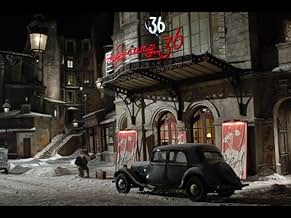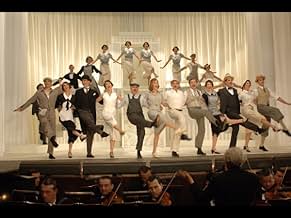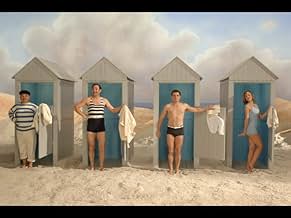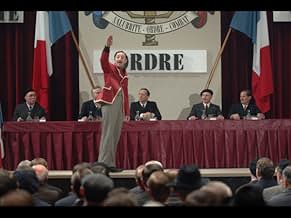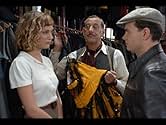PUNTUACIÓN EN IMDb
6,5/10
3 mil
TU PUNTUACIÓN
Añade un argumento en tu idiomaWhen Chansonia, a nightclub, is shut down by the landlord, the stage manager Pigoil is forced to look for a new job. He finds hope when he discovers a young woman with a lovely singing voice... Leer todoWhen Chansonia, a nightclub, is shut down by the landlord, the stage manager Pigoil is forced to look for a new job. He finds hope when he discovers a young woman with a lovely singing voice.When Chansonia, a nightclub, is shut down by the landlord, the stage manager Pigoil is forced to look for a new job. He finds hope when he discovers a young woman with a lovely singing voice.
- Dirección
- Guión
- Reparto principal
- Nominado para 1 premio Óscar
- 3 premios y 7 nominaciones en total
Reseñas destacadas
I may have seen one of the last musical hall revivals in London a few years ago on The Strand—it was full of tinny song and dance that made you tap your feet and long for the good old days of vaudeville and innocence. The telly has pretty much killed that simple pleasure, but Paris 36, a melodramatic story of the revival of a Chansonia in northern Paris, 1936, revives the joy of ensemble acting and dancing, original music, and the intrigue so much a part of the lively arts when they become business and pleasure.
Three Parisians undertake saving a music hall in their section of Paris called Faubourg using the talents of a star-crossed couple supplying the on and off stage romance. The intrigue is much less than Cabaret's; the nostalgia is more than Cinema Paradiso's; it's all more Moulin Rouge than Amelie. The songs are fetching, made especially for the film, and the plot is pure cliché right down to the lecherous businessman and cute ingénue.
The background is unmistakably fascist versus socialist, owners battling workers for a depression-era slim slice of the economic pie and soul. Paris 36 risks it all with formulaic intrigue and predictable denouement. Yet throughout is a good cheer, a bel canto breeziness that draws you in to song, dance, history, and politics, never too heavy, light enough to make you wish that music hall still stood on The Strand.
Three Parisians undertake saving a music hall in their section of Paris called Faubourg using the talents of a star-crossed couple supplying the on and off stage romance. The intrigue is much less than Cabaret's; the nostalgia is more than Cinema Paradiso's; it's all more Moulin Rouge than Amelie. The songs are fetching, made especially for the film, and the plot is pure cliché right down to the lecherous businessman and cute ingénue.
The background is unmistakably fascist versus socialist, owners battling workers for a depression-era slim slice of the economic pie and soul. Paris 36 risks it all with formulaic intrigue and predictable denouement. Yet throughout is a good cheer, a bel canto breeziness that draws you in to song, dance, history, and politics, never too heavy, light enough to make you wish that music hall still stood on The Strand.
If this film had been produced 60 to 70 years ago,it probably would have been directed by Jean Renoir and starred Jean Gabin as one of the central figures. 'Faubourg 36' (or as it is being distributed in English speaking countries as 'Paris 36')is a film that takes place in Paris, just before world war 2,when political tensions were at a boiling point between left leaning French & their ultra conservative right wing counterpoint (which would eventually embrace the Nazi party in Germany,especially when Hitler marched into Paris in the 1940's). A (failing)theatrical troupe,bent on preserving their beloved theater tries to pull things back together,they get support from some of the locals (including an alleged Communist,who claims he was in the Red Brigade in Russia),a young lass trying to break into the singing profession,a (mostly)unfunny comic & enough well meaning persons to try and bring things together. A corrupt local political figure,who wants to do little more than bring the ruination of the theater also looms. The film is complimented by a cracker jack cast of French professionals who turn in a splendid job of acting. The screenplay, although something of an overstuffed sandwich of sorts,is still well played out. The film features several songs,most of which are performed by the cast,themselves. At times,this film has a Busby Berkley feel to it (which is not a bad thing). In French with English subtitles. Rated PG-13 by the MPAA,this film contains a bit of rude language,some suggestive material that parents of very young children may not appreciate,and some violence (but nothing too gory that could disturb some sensitive audiences). Well worth a look.
Nora Arnezeder reminds me of movie stars of the thirties : beautiful, charming, she can sing, dance, act... Star quality ! As for the film itself, the story is rather simple, which I come to realize, is often what makes it good. It's not so much what the story is about but rather how you tell it. And in that case, you get to laugh, cry, you care about that Pigoil who looses his job, his wife and even his son and who doesn't lose hope, about Milou and Douce's love story. You'll love the great new songs, the homage to Busby Berkeley, Jacky's lousy jokes (a reprise of Kad's own TV skit) and secondary characters played by first-rate comedians like François Morel and the great Pierre Richard. What's not to like ?
Pigoil (Gerard Jugnot) runs a small vaudeville like theater, the Chansonia, in the Faubourg section of Paris. His wife is a "star" of the theater and the rest of the performers are a tight-knit group. Perhaps, too close, for Pigoil is given a double whammy one day. First, his wife has been sleeping with not one, but, two of the other troupe members and, even more sadly, the owner of the building can not pay his debts (it is the depression everywhere) and commits suicide. Soon, Pigoil and his young, idolized son Jojo are barely scraping by. But, then, Pigoil makes a deal with the Fascist like gentleman who truly runs the neighborhood. Can his show group have one month to make the theater profitable again? The ruthless man agrees to give them a chance, for he has his eye on one of their newest performers, a beautiful young singer named Douce. Will the Chansonia become successful once more? This is an unusual look at life in the depression, for it has a French setting, where fascism was brewing in neighboring Germany and in France. There are many subplots to the main one, including one of an agoraphobic music teacher, residing across from the Chansonia, who was once a leading song writer and who has an unlikely connection to Douce. Needless to say, the recreation of the former theater district is very fine, as are the costumes, the cast, the story, and the direction. Therefore, if you like foreign films and unusual tales, put this on your list for future viewing. It is a fine example of quality French cinematic achievements.
It's difficult to explain this film's charm, but suffice it to say that if you love Paris and films about it, this portrayal of the city in 1936 will sweep you off your feet. At two hours long and in French, the movie may seem off-putting at first, but go with the flow and savor the fine direction, cinematography, sets, and the original music by Christophe Barratier. The story takes place in and around a Paris music hall, the proprietor of which has been charged with murder; during his confession we learn the story of the music hall in flashback performances. Even the kindest critics dismissed the film as what one called "a gleaming hunk of French period schmaltz." Exactly what I liked about it.
¿Sabías que...?
- CuriosidadesFaubourg is not French for "the district." It is a contraction of "faux bourg", French for "false town" and were used to designate smaller towns attached to larger towns or cities. A lot of these faubourgs were independent cities until they were attached to Paris and lost all independence around during the 17th and 18th century. A new outer wall was later erected around the city. These faubourgs, especially those on the East side, were usually blue collar, with a very active night life.
- PifiasWhen Jacky accidentally turns on the radio while Pigoil is talking to his wife and her new lover, the radio is very loud immediately after Jacky flips the switch. On this type of old tube amplified radio, it would take several seconds for the tubes to heat up and amplify any signal, and the volume would go up very slowly.
- ConexionesFeatured in The 82nd Annual Academy Awards (2010)
Selecciones populares
Inicia sesión para calificar y añadir a tu lista para recibir recomendaciones personalizadas
- How long is Paris 36?Con tecnología de Alexa
Detalles
- Fecha de lanzamiento
- Países de origen
- Sitios oficiales
- Idioma
- Títulos en diferentes países
- Paris 36
- Localizaciones del rodaje
- Surtainville, Manche, Francia(beach scenes by the end)
- Empresas productoras
- Ver más compañías en los créditos en IMDbPro
Taquilla
- Recaudación en Estados Unidos y Canadá
- 851.540 US$
- Fin de semana de estreno en EE. UU. y Canadá
- 44.690 US$
- 5 abr 2009
- Recaudación en todo el mundo
- 12.940.622 US$
- Duración2 horas
- Color
- Mezcla de sonido
- Relación de aspecto
- 2.35 : 1
Contribuir a esta página
Sugerir un cambio o añadir el contenido que falta

Principal laguna de datos
By what name was París, París (2008) officially released in India in English?
Responde




